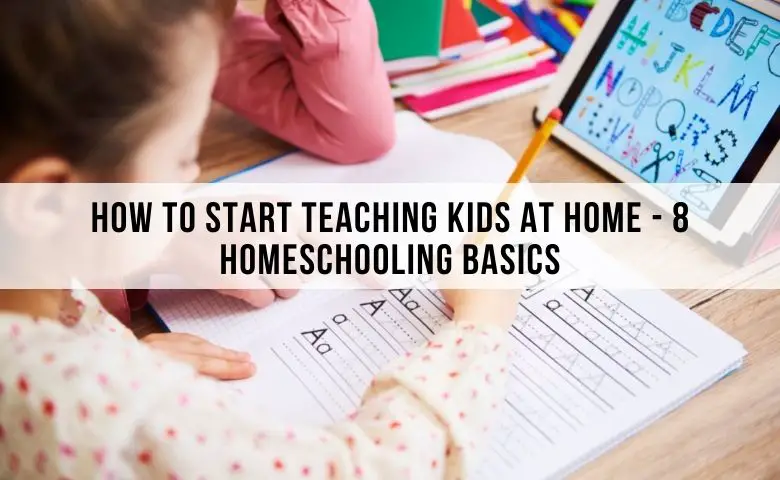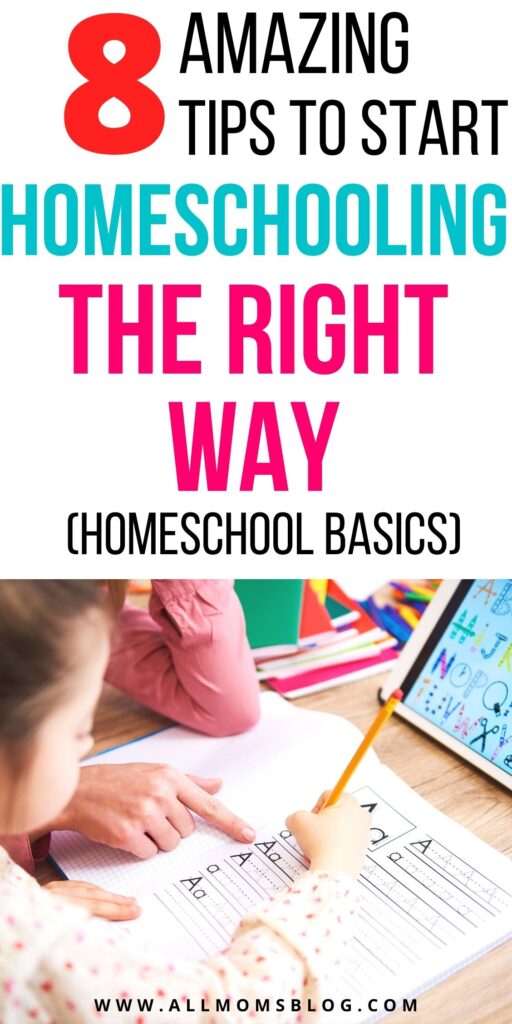More than 861 million children are learning from home now, as schools globally shutter to try and slow the spread of Covid-19.
So, if you want to homeschool where do you start?
While I don’t claim to have all of the answers to the questions, I hope to give some direction to helpful ideas and resources available and a little more of a peek at how you can navigate yourself in this whole homeschooling process.
If you are thinking about homeschooling, this article may be a help to you as you begin – or an encouragement to you as you continue your homeschool adventure.

How Many Homeschoolers Are There?
According to the National Center for Education Statistics (NCES) in the United States, “Overall, about 3 percent of students ages 5 through 17 were reported as being homeschooled, representing 1.7 million homeschooled students in 2016.”
Most states in the U.S. also keep track of the numbers of homeschoolers in their state.
Why Homeschool? Few Benefits of Homeschooling
Homeschooling has been widely known for its flexibility. Even before the advent of COVID-19 people used to homeschool their kids.
The flexibility of homeschooling allows parents to help their kids learn in the ways that work best for them and based on their individuality.
Since homeschooling parents do not need to follow the conventions of a school, they can customize, choose their own curriculum or approach.
The best part is, homeschooling kids are widely accepted in colleges and in the workplace. Homeschooling also helps to build positive family relationships through the challenges faced during teaching kids at home.
This guide will highlight the important details on how you can start homeschooling your kids easily and effectively.
Who Is This Guide For?
This guide is for every single parent who:
- Parents who are looking to homeschool their kids during qurantine
- Parents who want to homeschool regardless of COVID-19 situations
- Parents who are working outside their homes
- Parents who work from their homes
- Parents who never intended to homeschool, but who have kids trying to learn from home – either with or without curriculum from their “regular” school – during COVID-19
If you’re ant one of the above listed, read on to find some helpful tips for homeschooling your children.
How to teach kids at home – Homeschool bascis
Once you have made the decision to homeschool, planning your next steps can feel overwhelming. At this point, you may have more questions than answers. Here are 8 areas to focus on as you prepare to begin homeschooling.
First things first! Make A List

Prior to starting any routine – any routine, it is crucial that you list out everything you need to get done on that day. It doesn’t matter how you do it!
I still have a notepad from 2015 and I write my to-do it on it. I generally write part-time jobs, full-time jobs, things I need to get done today, grocery – literally everything on that.
Finally, I have got my hands on one Happy Planner and I use it now. But you can use Post-Its, a Google Doc, a whiteboard, the back of your hand, whatever.
Make yourself a list of what you need to juggle today.
This list should be completed before you sleep. it has to have everything you are supposed to do tomorrow – appointments, work tasks, homeschooling objectives (depending on your learning method).
Trust me, you also need to write “Keep chicken in the freezer” as you don’t want to remember that during the middle of your kid’s homeschooling session 😀
This is what keeps me sane and gets me ready for homeschooling my kids!
Keep Up With Your Household

Let’s get real here! For most of us, this is our least priority when compared to our kids’ learning, your work, and your personal life. That’s the reason I want to start with it.
I love a clean house, but with years of realizing that clutter around my house is what takes my maximum time and energy, I have started decluttering my house.
I have a system of decluttering on weekends and that works for me. After getting rid of most of the items from my home, I have efficiently been able to reduce the time spent on home cleaning. Our major areas of work are laundry, cooking, and daily vacuuming.
You gotta keep clean the house as a mom, so you need to focus on how you adjust your household chores and your homeschooling schedule.
When you’re trying to homeschool your kids, discipline is crucial! Being organized is important as being flexible. If you’re someone learning how to organize your life and house like me, Hilary’s THE ORGANISED HOME COURSE will help you through!
Keep Up With Your Homeschooling

One of the biggest motivations for homeschoolers is that the homeschooling curriculum is actually going to use less of your family’s time than the traditional school.
I absolutely want to make clear here that there is no universal right curriculum or homeschooling method. My family is really far on the informal end of things, but for some parents, a much more structured approach is the right one.
There are plenty of homeschooling parents who drive themselves crazy by planning way too much time for school.
Whether you are working outside or from home, parenting 1, 2 maybe 5, or 10 kids, I cannot imagine you can devote 8 hours of your day homeschooling.
And if you do, I believe there is barely any room left over for the other things that you might have on your to-do list.
So, my advice is you don’t need to homeschool your children 8 or 10 hours a day or even 3 to 4 hours a day. The key is flexibility.
Sometimes, the best way to gain flexibility, in the long run, is to invest a lot of time at the start to make things go smoother day to day.
You’re welcome to discuss with your child the curriculum schedule if there is one and experiment. See how things go!
Develop a Schedule

There are many unique factors to consider when developing a daily schedule for homeschooling. For example,
Are your kids at childcare for part of the day, with homeschooling occurring after you return from work?
Do you have a baby or toddler to care for while homeschooling an older child?
Do your children wake up really early and need a nap after lunch?
Does your household operate more smoothly with a more leisurely start to the day?
Part of the flexibility of homeschooling is creating a schedule that works best for your family’s needs. You may decide to schedule blocks of time each day that will be devoted to homeschooling. The start and end times can be loose frameworks that you adapt if necessary.
A particularly engaging activity may take longer than you anticipated. Or, a sudden event unrelated to school may pop up and require you to change your schedule.
You can also structure your schedule according to what you would like accomplished each day. For example, you may have an activity that is a priority to complete. Schedule that task first to ensure it gets done then have one or two others you may start today and finish later.
It’s not necessary that you cover every subject, every day. But it’s also possible that your children are engaged in a more long-term project that they work on every day for a week or more. Again, this is the flexibility that homeschooling offers.
Ultimately, it is your decision about what your homeschooling days will look like. In addition to the considerations outlined above, you also have to think about how you operate best with regard to organizing your time.
You may prefer to have a clearly defined timetable for each day. Or, you may work better with a rough outline of what you’d like to accomplish by the end of the day.
Create A Space At Home

It can be helpful to have a designated space in your house for homeschooling. Although some hands-on activities may occur in specific areas (e.g., baking), it is a good idea to have space where quiet activities like reading and writing will occur.
This can be a desk or a less traditional space like the kitchen table or breakfast bar. It can also be convenient to have a space you will use during messier activities, like artwork or science experiments.
Equip the space with supplies that you need handy during learning activities. This can include items like pencils, paper, scissors, glue, and pencil crayons. A whiteboard and dry erase markers can be convenient for times when the paper isn’t necessary.
You may choose to have notebooks or folders if you want to organize learning materials by subject. You may also wish to have some art supplies on hand like construction paper, paints, and paintbrushes.
As you gain more experience with homeschooling, you may find other items on your wish list, such as math manipulatives like counters, dice, or connecting cubes. You might also discover that you’d benefit from having a laminator. These aren’t essential purchases but are up for consideration.
Learn Opportunities Inside and Outside the Home

An advantage of homeschooling is the opportunity to participate in less traditional learning opportunities, including those that are truly authentic and those that occur away from a table or desk.
For example, children may help with preparing a meal, allowing them to read a recipe, estimate, measure, count out cutlery, and begin learning cooking skills. They may help with the family’s garden, including choosing what to plant, watering, weeding, and harvesting.
There are lots of incidental, authentic learning opportunities that occur throughout the day. Children can help write the grocery list, address and send mail, and help with age-appropriate chores like loading the dishwasher or sorting laundry.
Homeschooling can incorporate learning activities outside the home. Physical activity can be a trip to the playground, the trampoline park, or the skateboard park. Learning can occur during trips to the zoo, museum, aquarium, farm, recycling center, pumpkin patch, or pet shelter.
You may even be able to explore community buildings like the post office, police station, fire station, and bank.
Find a Network Of Other Homeschooling Parents

Connecting with other homeschooling families will provide you with a network of like-minded people who can look to each other for guidance and support. You may be able to find a local group to join. You can learn from the experiences of more veteran homeschoolers and share challenges and solutions with those like you who are just beginning their journey.
Local groups may set up times for parents to meet in person to discuss ideas and initiatives and to help each other problem-solve. There may also be opportunities for children to participate in activities and events and to attend field trips together.
Joining a network can make homeschooling feel less isolating for both parents and their children.
Families with similar values and ideals around schooling can connect and provide each other with encouragement.
You may also wish to seek out blogs written by homeschooling parents. These can give you firsthand accounts of the homeschooling experience.
Find Great Resources

A key area to focus on is finding resources to use for homeschooling. A good starting point is to give consideration to what type of curriculum you will be using. Unlike traditional schooling, homeschoolers do not have to adhere to a specific curriculum and instead, have the freedom to choose what and how their children will learn.
Some homeschoolers choose to use their school district’s curriculum as a guideline for their children’s learning. Others choose to purchase a commercial curriculum specifically created for homeschooling families.
Another option is to create your own curriculum, mapping out the content and skills you want your children to learn throughout the year.
A second key consideration regarding resources is finding learning materials to use. Although this may seem overwhelming, there are various different resources for you to start homeschooling. From reading and writing to science and math, there are a huge number of learning activities available for homeschoolers.
There are also homeschooling families who use a more child-led approach and teach skills and concepts as they occur in natural day-to-day activities. It is also possible to use a combination of some or all of these options.
Use your time wisely and instead of creating resources from scratch, tap into the many ready-to-go printables and activities available to you.
Conclusion:
When parents are new to homeschooling, it can seem overwhelming. But, it doesn’t have to be a stressful time. These homeschooling basics will help you have your homeschool up and running as stress-free as possible.
Hopefully, these 8 areas will give you a solid starting point as you plan your homeschooling experience. As time goes on, you will learn more about your family’s needs and what works best for you.
You have the flexibility to tweak your schedule and plans in response to the feedback you receive from your children and as you self-assess.
Remember that you are not alone in your journey. Reach out for support and use the many resources that have been created with homeschooling parents in mind.
Related Articles:
Age Appropriate Chores For Kids 1 – 11+ Years
The 8 Most Effective Strategies To Raise Confident Kids
11 Effective Tips To Reverse Defiance In Kids
How To Make Your Child Listen Without Yelling
Don’t Forget To Pin It For Later!

How to Start Teaching Kids at Home -Homeschooling Basics
Alesia Netuk
Alesia is a founder of PrimaryLearning.org, an educational website that helps elementary school teachers and homeschool parents with hands-on worksheets, activities and thoughtful articles.

Great tips! I homeschooled our youngest 3 and I definitely recommend finding other homeschooling families/moms to connect with! With social media, we can find them online now and that really helps, especially with Covid. Thanks for these tips!
Hi Jen! Glad you liked the article. I personally am trying to homeschool my kids, but unfortunately, I have no other people around. Social media in this case does help a lot. I found plenty of moms online and got a lot know from them.
One useful tip for submitting schoolwork done on paper if you have an iPhone :
1.tap and hold the notes app some options will appear
2. Choose the scan option
3. Position the paper within the scan boundaries, make sure paper is in a well lit area
4. Scan and email or upload your work.
These tips are great! Lord knows o need all the pointers o can get with 4 little ones to homeschool.